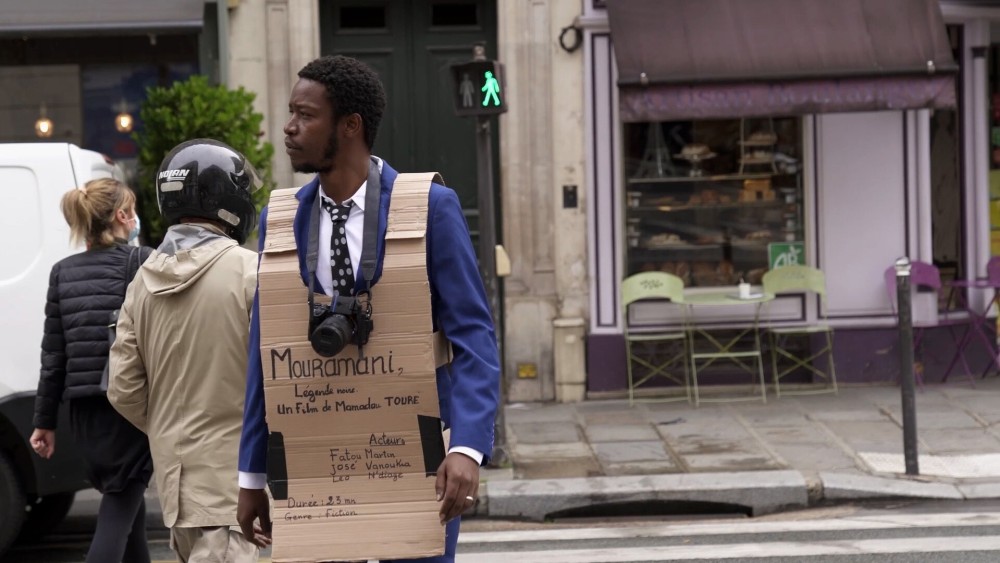
Movies have always thrived on the power of nostalgia, of viewers placing themselves in a historical context and seeing that self represented on screen — and this is just some of what Guinean filmmaker Thierno Souleymane Diallo explores in his debut feature “The Cemetery of Cinema.” Ostensibly the story of a quest to find a lost film — “Mouramani,” made in 1953 by Diallo’s compatriot Mamadou Touré — this documentary becomes both a playful meditation on why films matter and a rather sober examination of how history can be lost when not preserved. Diallo’s command of the thin line between absurdity and profundity makes it both an entertaining and contemplative watch.
No one is even sure what “Mouramani” is about — only that it’s the first film ever made by a Black French-speaking director who was a pioneer of the form in that region of the world, and whose work should be fully preserved and exhibited in repertory. Stories vary about the film: Some claim it’s about the Islamizalization of the Malinke people, others that it’s a simple story about a man and his dog. Many in Guinea know of it, but no one has seen it. Is it real or just a myth?
Driven by a love of both cinema and his country’s history, Diallo sets out on a quest to find the film, or at least someone who has seen it. As he travels through Guinea, following in the footsteps of Touré, he attempts to prove the validity of his profession and to pay homage to those who came before him. Diallo’s nostalgia — and, in turn, that of everyone who consumes and loves cinema — becomes apparent as he and co-cinematographer Leïla Chaïbi luxuriate in the touch and feel of old film stock. As the camera closes in on Diallo trying to decipher images, there’s a palpable adoration here for all the material things that constitute filmmaking.
Diallo talks with as many people as he can about the lost film — archivists, film students, professors — and reveals much of Guinea’s film history in the process. Through these conversations the truth is revealed about how political regimes influence what’s preserved and what’s not, and how anything (or anyone) can be lost when powerful men fear art that jeopardizes that power.
When Diallo visits villages, filming people whose only connection to the medium is as audience members, the film reveals how cinema enthrals as a communal event. Furthermore, when he shows these villagers the footage of themselves, he makes a salient point about representation: Faces lit up, they yell and laugh with joy from recognizing themselves as a flickering image on a big screen. In such scenes, Diallo encapsulates that hot-button issue better than countless articles and symposiums on the subject in recent years.
Diallo’s playfulness as a filmmaker and a narrator comes more into focus as he inserts himself into the narrative in myriad ways. Shots toggle between himself and what he is shooting, arriving at something unsettling as he forces the viewer to contend with what is fact and what is fiction. Do scenes unfold organically in front of his camera, or is he manipulating them by the mere fact of being there? Such moments are too fleeting to substantially deconstruct the documentary form, but they do offer the audience a contemplative pause.
As a narrator, he makes bolder choices: acting before documenting said action. As his search becomes more of a quixotic quest, he embraces its absurdity. Donning signs and printing facts about the film on his clothes, he travels to France as a last resort. Perhaps the former colonial country will have a trace of this African film. He talks to strangers who are perplexed by his outfit, and visits an archive and a cinema playing a Batman movie, talking to many people along the way. These encounters lead nowhere conclusive, but are nonetheless poignant in their determination. Proving the point of the cliché “it’s about the journey, not the destination,” “The Cemetery of Cinema” stands in for its lost quarry. Diallo’s film ensures its predecessor’s preservation.













